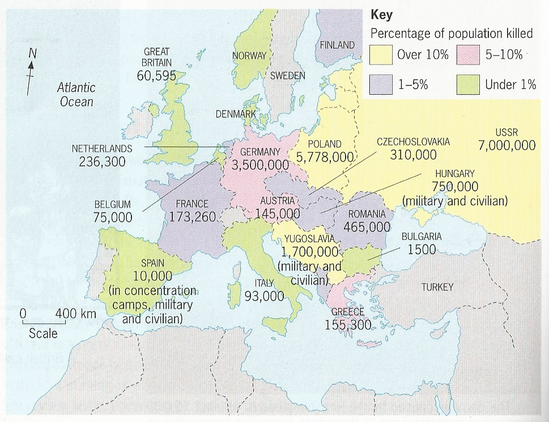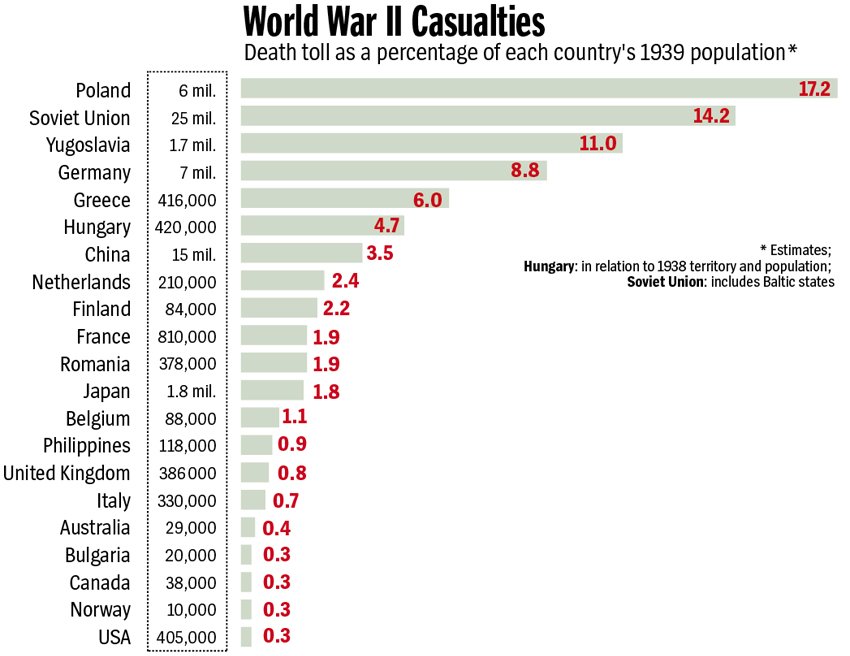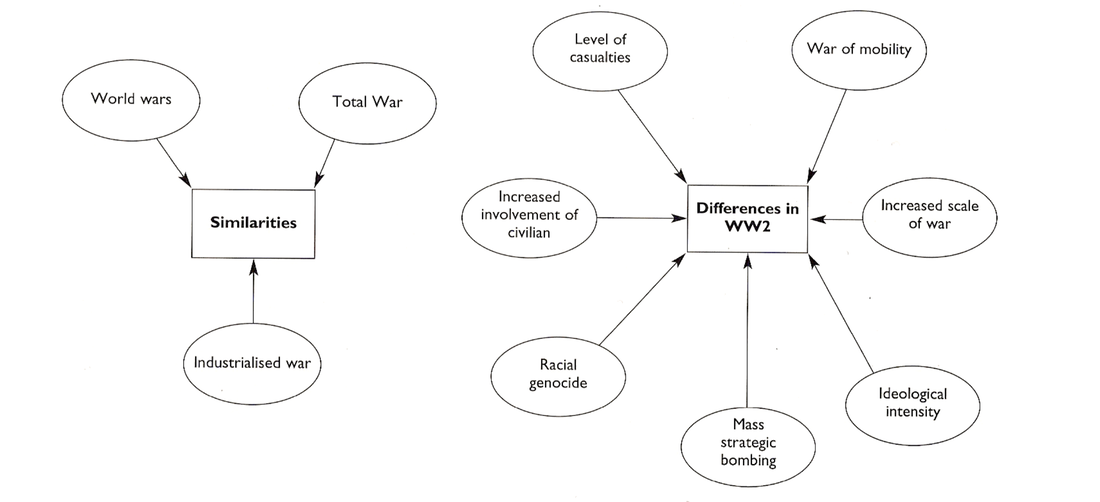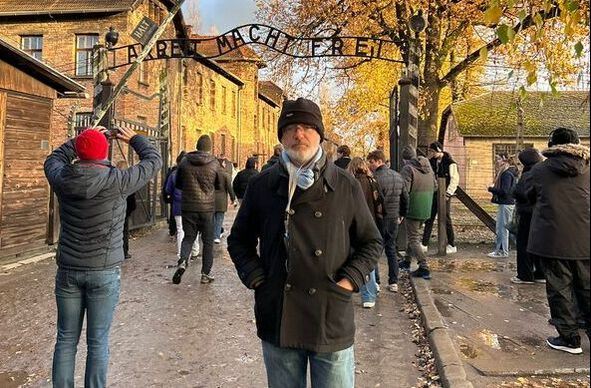Lesson 8 - Total War
|
|
The Second World War can only be described in superlatives; it was the most destructive war in history causing more deaths, and involving more countries, than any previous conflict. Six years of war had left Europe in a state of utter devastation. Europe experienced ‘total war’ on a terrifying scale, destroying lives not just where formal military conflict occurred but throughout civilian populations suffering bombing, occupation, persecution, exploitation and extermination. Hopeful ideas of human progress and the superiority of “European Civilisation” had already been battered by the horrors of World War One, the economic disasters of the 1930s, and the political extremism that followed. The liberation of the Nazi concentration camps exposed a further, barely comprehendible depth of industrialised cruelty.
|
Few countries in Western Europe were able to avoid the traumas of war. Between allied victory and axis defeat countries such as France, Belgium, the Netherlands, Luxembourg, Denmark and Norway suffered invasion by Nazi Germany followed by occupation, exploitation, and eventually, liberation. The United Kingdom, though undefeated, endured the threat of invasion and the bombing of its cities. For Italy, war brought defeat, invasion and civil war as Axis and Allied forces fought across Italian territory. Spain, Switzerland, Sweden, Portugal and Ireland maintained varying degrees of precarious neutrality as war raged around them. It is not to belittle the scale of these events to acknowledge that the War in Western Europe was less destructive than in the East. Nazi racial ideology could accommodate a degree of respect for the peoples of Western Europe that was absent in the East where the conflict was a ‘war of annihilation’, carried out with the aim of destroying entire categories of people. As we have already seen, the same racial ideology also led to unprecedented atrocities being carried out in Japanese empire.
To get a visual sense of the numbers of casualties in World War II, watch this brilliant film or visit the interactive format.
To get a visual sense of the numbers of casualties in World War II, watch this brilliant film or visit the interactive format.
How similar was the Second World War to the First?
Some similarities are obvious. Both were 'total wars', involving civilians as well as combatants. Because both wars stretched nations' resources to the limit, the overwhelming strength of the USA was a crucial factor in determining the result. In both 1914 and 1940-41 Germany had startling initial successes but in the end could not hold out against the superior resources of their opponents.
Some similarities are obvious. Both were 'total wars', involving civilians as well as combatants. Because both wars stretched nations' resources to the limit, the overwhelming strength of the USA was a crucial factor in determining the result. In both 1914 and 1940-41 Germany had startling initial successes but in the end could not hold out against the superior resources of their opponents.
Some apparent similarities conceal important differences. Britain, France, the USA, Russia and Belgium fought together against Germany in both wars, but in the First they were joined by Serbia, Italy and Japan, and in the Second by Czechoslovakia, Poland and the Netherlands (neutral in the First World War). Turkey and Bulgaria joined Germany and Austria-Hungary in the First World War, while Italy and Japan changed to fight in alliance with Germany in the Second. The 1914-18 war was called a world war, and indeed there was fighting outside Europe - in the Middle East, Africa and on at sea. The 1939-45 war, however, was more genuinely a world war: more of Europe saw fighting, as did north Africa and the Atlantic Ocean. But this time there was also another war over a wide expanse of another part of the globe: the Pacific War from December 1941 to August 1945.
Clearly, the two wars were different for every country, but in the cases of Russia and Germany the differences are so great that they require comment: Hitler was initially more successful than the German High Command of the First World War, but his decision to fight on to the bitter end left his country shattered and divided. As for Russia, the early disastrous defeats must have looked like history repeating itself. However, the fight back of the Second World War was in complete contrast to the sequence of events leading up to the humiliating Treaty of Brest-Litovsk of 1918.
Clearly, the two wars were different for every country, but in the cases of Russia and Germany the differences are so great that they require comment: Hitler was initially more successful than the German High Command of the First World War, but his decision to fight on to the bitter end left his country shattered and divided. As for Russia, the early disastrous defeats must have looked like history repeating itself. However, the fight back of the Second World War was in complete contrast to the sequence of events leading up to the humiliating Treaty of Brest-Litovsk of 1918.
Civilians and Total War
There is a very good, visually interesting section of your textbook (298-316) which deals with how the war affected civilians. It deals with the topics of civilian conscription, women, propaganda, rationing and air raids, but it is very British. In order to balance the Anglocentric nature of the book, the following sources are useful.
The film 'The Home Front...' is a whole series of 20 minute films dealing the civilian war using film shot by the civilians themselves in Britain and Germany. It's quite old now but I've always found the material interesting.
There is a very good, visually interesting section of your textbook (298-316) which deals with how the war affected civilians. It deals with the topics of civilian conscription, women, propaganda, rationing and air raids, but it is very British. In order to balance the Anglocentric nature of the book, the following sources are useful.
The film 'The Home Front...' is a whole series of 20 minute films dealing the civilian war using film shot by the civilians themselves in Britain and Germany. It's quite old now but I've always found the material interesting.
|
|
|
|
The 10th of June - Lidice 1942 and Oradour-sur-Glane 1944
|
|
Lidice, a small village in Czechoslovakia, was destroyed June 10, 1942. After the assassination on Reinhard Heydrich, May 27, 1942, the village was razed to the ground. 173 men were shot dead, women and most of the children were transported to concentration camps. There was no 'reason' why Lidice was chosen.
On the same day, two years later at Oradour- sur-Glane in France, 642 of its inhabitants, including women and children, were massacred by a German Waffen-SS company. There was no 'reason' why Oradour was chosen. Neither village was rebuilt and both are memorials today. |
|
The Holocaust
In March 1945 Red Army soldiers entered Auschwitz; on 4 April, US soldiers arrived at the small camp of Ohrdruf where 3,000 Jews had been murdered four days before the liberators arrived. Generals Eisenhower and Patton were with them and Lewis Weinstein, one of the US soldiers, described their reactions: 'I saw Eisenhower go to the opposite side of the road and vomit. From a distance I saw General Patton bend over, holding his head with one hand and his abdomen with the other. I suggested to General Eisenhower that cables be sent immediately to President Roosevelt, Churchill and de Gaulle, urging them to send representatives.' |
|
There was no need: as the Allied armies moved into Germany in the last weeks of the war the full extent of the Holocaust became visible. The British saw the awful facts in their newspapers after reporters entered Belsen with British forces on 15 April 1945. It should not have been news to the world's public. Nazi persecution of the Jews in Germany before the war was well-known.
The 'Final Solution' began in 1941 when the expanding German Reich found itself ruling over many millions of Jews in Poland and Russia. The real figures for those killed were not known with any degree of accuracy until years later: 6 million Jews, 3 million non-Jewish Poles, 3 million Russian prisoners-of-war, a million gypsies and hundreds of thousands of homosexuals and people with disabilities.
In 1945 news of the Holocaust had two effects: firstly, the Allies were not inclined to be merciful to the Nazis and the German people; secondly, it helped to put an end to the belief that Europeans were more civilised and culturally advanced than other peoples.
Activity
Read the sheet 'World War II - Total War'.
Download and complete the table comparing the First and Second World Wars as 'Total Wars'.
You will need your earlier activity on World War I as a total war.
Read the sheet 'World War II - Total War'.
Download and complete the table comparing the First and Second World Wars as 'Total Wars'.
You will need your earlier activity on World War I as a total war.
Conveniently enough John Green's new European Crash Course History has just arrived:




